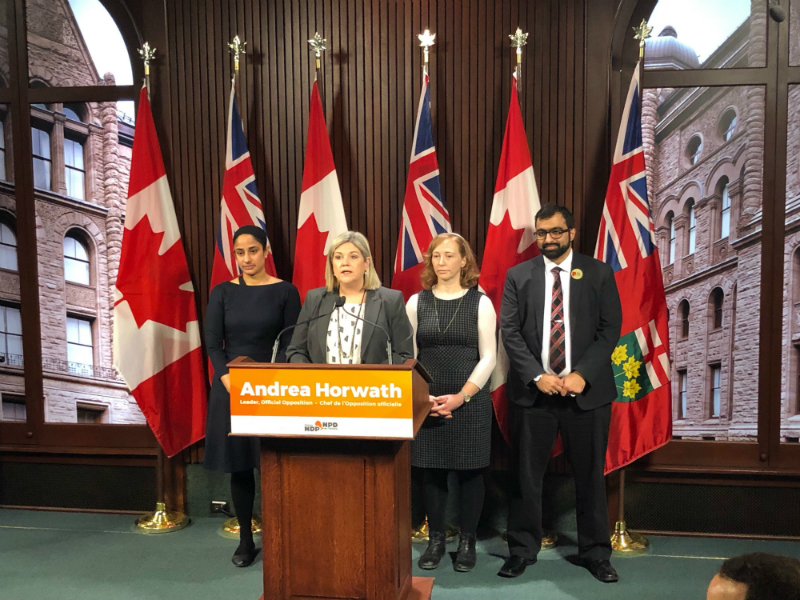With strong support from Jewish MPPs, legislators in Ontario have roundly condemned Quebec’s secularism law, which bans some public-sector workers from wearing religious symbols in the workplace.
A motion denouncing Quebec’s Bill 21, which was introduced by Ontario NDP Leader Andrea Horwath, passed unanimously in a voice vote at Queen’s Park on Nov. 25.
The non-binding motion called on Premier Doug Ford to formally request that the Quebec government “immediately repeal” Bill 21 and intervene in any Supreme Court challenge of the law, Horwath told the legislative assembly.
Earlier, Horwath held a press conference in the legislature’s media studio with religious leaders, including Rabbi Julia Appel, the secretary of the Toronto Board of Rabbis.
“I believe we must send a clear and direct message that this legislation was wrong – and it is wrong – and that it really has no place whatsoever in our democracy,” the NDP leader told her fellow MPPs in a passionate defence of her motion.
“We all need to work together to fight Islamophobia, anti-Semitism and xenophobia wherever it happens and whenever and wherever we see it.”
Bill 21 bans public-sector workers in “positions of authority” – police, teachers, judges and prosecutors – from wearing turbans, kippot, hijabs and other religious symbols in the workplace.
The law, titled “An act respecting the laicity of the state,” was passed in June by the majority Coalition Avenir Québec government, and has raised concerns that it violates the rights of Muslims, Sikhs and Jews under Canada’s Charter of Rights and Freedoms.
Jewish MPPs forcefully spoke out against the law.
Roman Baber, the Conservative member for York Centre, does not normally wear a kippah, but he sported a bright blue one when he told the legislature that in Quebec’s national assembly, “I would not be able to stand here, as I am in front of you today, for wearing my kippah. I would not be able to serve my constituents or my province. I would not be here.”
Gila Martow, the Conservative MPP for Thornhill, noted that, “Turbans, hijabs, kippahs, yarmulkes – these are all expressions of the wearers’ commitment to their religion and culture. It’s part of their identity.… It’s demoralizing to expect people to choose between their job and their faith.”
As a child living in Montreal, Rima Berns-McGown, the NDP MPP for Beaches–East York, said she experienced a great deal of anti-black racism and anti-Semitism, “and I know first-hand the alienating sensation of being told over and over again that you don’t belong and can’t belong.”
She called the law “an outright attack on vulnerable people. It is an official rebuke, an official ‘you’re not welcome here.’ ”
In other business at Queen’s Park, on Nov. 18, Martow introduced a petition in the legislature calling on Joel Harden, the New Democrat MPP for Ottawa Centre, to apologize for demanding the release of a senior member of the Popular Front for the Liberation of Palestine (PFLP), which Canada has designated a terrorist group.
In a series of tweets in late October, Harden said he was “saddened, sickened and disgusted” by Israel’s arrest of Khalida Jarrar, who he called “my parliamentary colleague.”
B’nai Brith Canada, which first raised the issue, noted that Jarrar is a “high-ranking” member of the PFLP.
She was elected under the PFLP banner to the Palestinian legislative council in 2006.
In 2015, an Israeli military tribunal sentenced her to 15 months in prison for incitement and promoting terror. She was re-arrested in 2017 and held in “administrative detention” for 20 months.
Jarrar was arrested again on Oct. 30 and is currently being held in administrative detention.
The PLFP has masterminded several terrorist attacks over the decades that claimed more than 30 lives, including those of two Canadians, according to B’nai Brith.
Asked by B’nai Brith to apologize, Harden tweeted that he stands by his call for Jarrar’s release.
The petition calls on Harden to publicly apologize, disavow Jarrar and denounce terrorism.
The government has 24 sitting days to respond. Harden did not return The CJN’s request for comment.
On Nov. 27, Manitoba’s legislature unanimously passed a resolution, brought forward by Premier Brian Pallister, to support citizens’ religious rights. The measure did not explicitly refer to Bill 21. The Manitoba government has also taken out ads in Quebec media telling civil servants they would be welcome in Manitoba if they feel threatened by the Quebec law.
